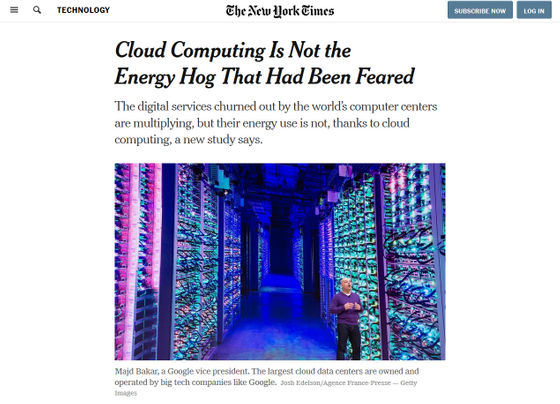Research results that data center processing capacity has increased six times, but power consumption has increased only by 6%

Data centers that support the Internet and cloud computing are increasing around the world due to the spread of IT technology. However, contrary to the image that a large number of devices are tightly packed and consuming a huge amount of power, it has been pointed out that the power consumed by data centers has not increased so much.
Recalibrating global data center energy-use estimates | Science
Data centers use less energy than you think
https://techxplore.com/news/2020-02-centers-energy.html
Cloud Computing Is Not the Energy Hog That Had Been Feared-The New York Times
https://www.nytimes.com/2020/02/27/technology/cloud-computing-energy-usage.html

Data Centers Aren't Devouring the Planet's Electricity—Yet | WIRED
Data Centers Aren't The Energy Suckers They're Portrayed As Being | IFLScience
https://www.iflscience.com/technology/data-centers-arent-the-energy-suckers-portrayed-as-being/
Past research has shown that increasing data center power consumption has been a serious problem, including simulation results that indicate that global data centers will consume 51% of global power consumption by 2030. It has been said that. However, as a result of joint research conducted by researchers at the Lawrence Berkeley National Laboratory in the United States and researchers at the research company Koomey Analytics , data center power consumption was made more efficient by technological advances, and as a result, power consumption was Was found to be almost flat.
Specifically, global data centers consumed about 194 terawatts in 2010, equivalent to 1% of the world's electricity consumption.In 2018, power consumption was about 205 terawatts, a growth rate of Only 6%. In the meantime, considering that data center processing capacity has increased 6 times, traffic has increased 10 times, and storage capacity has increased 25 times, the increase in power consumption has been extremely small.

According to Eric Masanet, associate professor at Northwestern University, the author of the paper, 'The power required for computation by a popular server is between 2010 and 2018 due to CPU efficiency and reduced power consumption at idle. That's about a six-fold reduction in performance, while power consumption has grown by only 6%. ' 'I hope this study will reset the image of the general public who regards large data centers as villains,' said co-author Jonathan Koomey.
These efficiencies are the result of data companies working to reduce power consumption. 2017 saw the
According to the New York Times, 'Google is at the forefront of large companies working to reduce data centers.' Google succeeded in saving 30% energy by leaving the control of the cooling system of the data center to AI . 'With these efforts, we are now able to deliver seven times the processing power with the same power as five years ago,' said Urs Hölzle, senior vice president of technology infrastructure at Google.
'Data from China doesn't seem to show any improvement, which means that data centers have the highest power consumption,' said Mike Demler, an analyst at Linley Group , a research firm specializing in the semiconductor market. It may be a factor that is pushing it up. '

Others have pointed out that efficiency is limited. Masanet predicts that efficiency gains will largely offset growth in data demand only in the next three to four years, after which it has no prospects. Therefore, Koomey proposed the following three energy policies to reduce data center power consumption more continuously.
・ Enhance incentives by expanding certification systems such as Energy Star to promote energy efficiency initiatives and ensure that efficiency is maintained for a longer period of time.
Increase investment in next-generation computing, storage and cooling technologies to limit future energy consumption and encourage the use of renewable energy to reduce carbon emissions.
Focus on areas such as data collection, monitoring, and data modeling to eliminate regulatory oversight and promote stronger data center energy policies.
Masanet said, 'We believe there is still room for efficiency in the coming years, but data demand is growing, and this fact is a sign of policy makers, data center operators, This means that not only equipment manufacturers, but everyone else, including us, data consumers, must make every effort to prevent the sharp rise in energy for the next decade. '' .
Related Posts:
in Hardware, Posted by log1l_ks







